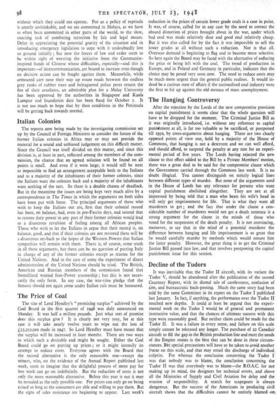The Hanging Controversy
After the rejection by the Lords of the new compromise provision on capital punishment it seems clear _that the whole question will have to be dropped for the moment. The Criminal Justice Bill as it was originally introduced, i.e. without any reference to capital punishment at all, is far too valuable to be sacrificed, or postponed till 1950, by cross-arguments about hanging. There are two clearly opposed points of view one, held by a majority of the House of Commons, that hanging is not a deterrent and we can well afford, and should afford, to suspend the penalty at any rate for an experi- mental period of five years. The Lords having rejected the pew clause to that effect added to the Bill by a Private Members' motion, there was a great deal to be said for the-compromise clause which the Government carried through the Commons last week. It is no doubt illogical. You cannot distinguish on strictly logical lines between different types of murder. But none of the arguments used in the House of Lords has any relevance for persons who want capital punishment abolished altogether. They are not at all impressed by being told that a man who beats his wife's head in will only get imprisonment for life. That is what they want all murderers to get ; and the fact that under the clause a con- siderable number of murderers would not get a death sentence is a strong argument for the clause in the minds of those who voted for the suspension of the death penalty. It is not convincing, moreover, to say that in the mind of a potential murderer the difference between hanging and life imprisonment is so great that he would carefully murder by methods which would ensure him the latter penalty. However, the great thing is to get the Criminal Justice Bill passed into law, and that involves postponing the capital punishment issue for this session.


































 Previous page
Previous page